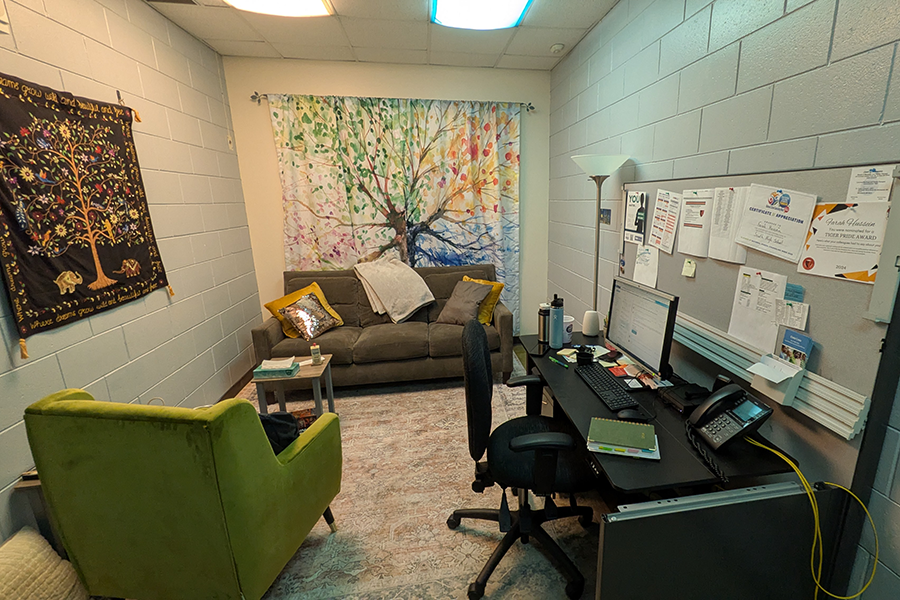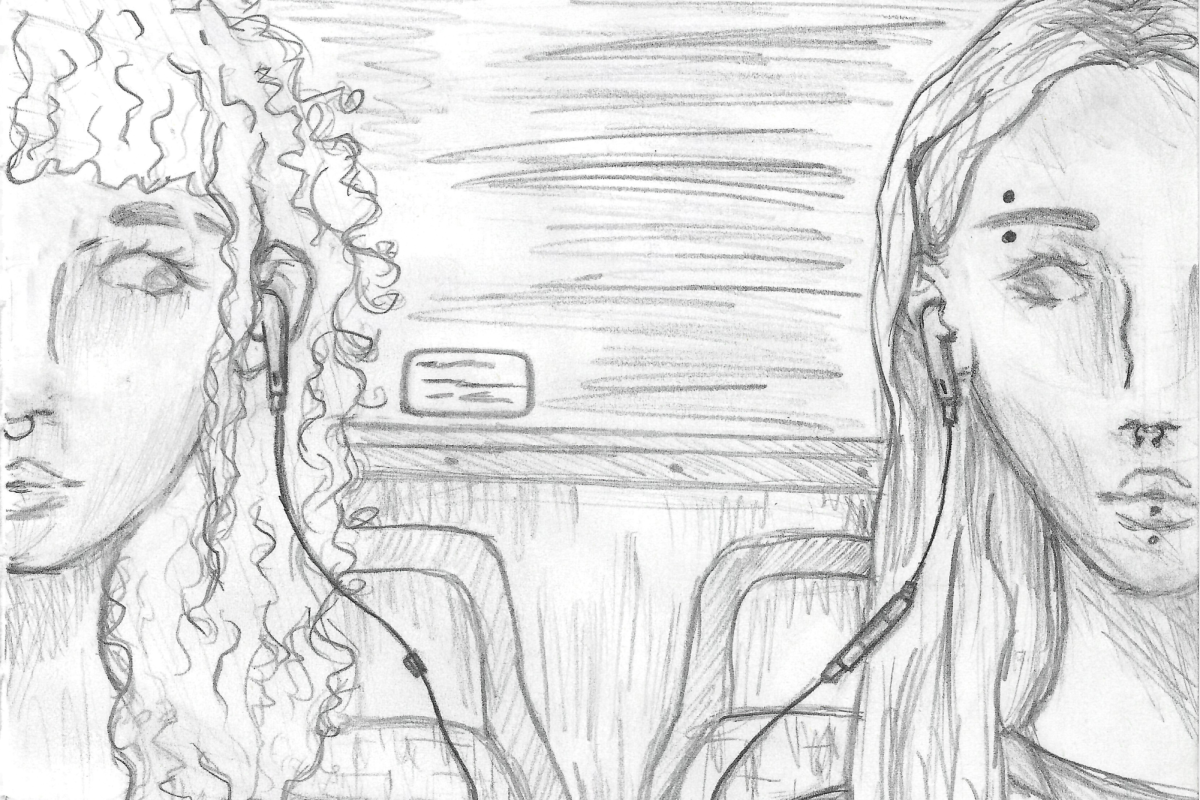“Hey you with the shorts,” a staff member once called to me, “get over here.” I slowly approached, tentatively pulling on my frayed shorts, knowing that I found them appropriate and my mother let me wear them. “Put your hands down,” she barked. My hands barely touched the bottom of my shorts, but even this was breaking the dress code. She looked at me carefully up and down.
“Don’t wear those shorts again, I could send you home,” she said, “They’re inappropriate and riding up in the back. Half your ass is hanging out.” Before I had time to defend myself or say anything, she walked off. For the remainder of the day, I felt more self-conscious and worried about the shorts than any other piece of clothing I have worn to school.
This experience left me feeling stunned, exposed, and disrespected. It wasn’t that the dress code was being enforced, it was the action of being taken aside and the disrespectful attitude that administration seemed to have towards me and my body. After several instances of this happening, I started to talk to other people and realized it wasn’t just me that administration was targeting: many other girls felt that the way the dress code was being enforced was demeaning to themselves and their bodies.
Junior Margot Franchett has also received this negative attention from administration. She reports an instance where she was waiting with junior Mara Benowitz for lunch when Assistant Principal Dagny Waldeland approached them and asked what grade they were in. “When we told her we were juniors, she said, ‘What were you thinking when you left the house this morning?’” stated Franchett, “I was wearing a dress that came past my fingertips and was not at all skin tight or revealing. Mara was wearing shorts that also came past her fingertips. When we showed her this, she proceeded to say, ‘You are an embarrassment and disgrace to this school.’ I was so frustrated with her that I just walked away.”
Even if Franchett and Benowitz hadn’t been wearing dress code appropriate clothes, this would be no way to confront the problem or to treat the students. No rule in the school should be enforced by public humiliation.
It is unacceptable to begin with that most of the dress code is geared at women–rules regarding leggings, shorts, skirts, and halter tops–but more importantly, the dress code is asking women to hide their bodies. It is embarrassing to me that South enforces the ideal that a woman should care more than a man about what she looks like or how she presents herself. Females at South should not be considered a “disgrace” if they do not wish to fit this ideal.
Not only are the remarks that staff members make inappropriate and sexist, they are also often demeaning and even derisive.
“They pulled my friend and me over,” said junior Naomi Schroeter, “We were both wearing Ragstock red leggings, I was wearing a red top and shorts, and she was wearing a long red shirt.” “They were laughing at what she was wearing and pointing out what was wrong with the outfit,” continued Schroeter, “‘What were you thinking,’ one of them said. ‘I don’t know what that’s trying to cover,’ said the other, mocking her even though it was pretty appropriate with the code.”
“When I went to the office and tried to talk to someone about the dress code, they brushed me off and told me to just follow the rules.”
By mocking students and effectively ignoring them when they try to approach them with input, the administration is showing the same characteristics present in an abusive relationship. If we as women are mistreated and then told to be docile and accept it, we will grow up to become docile. If we are consistently treated in a demeaning way, we will grow up thinking we should be treated that way. If we are consistently shamed for how we present ourselves, we will grow up to shame ourselves and view our bodies in a negative way.
It’s no wonder relationship abuse, eating disorders, and the objectification of women are all so prevalent in society if even a school is teaching the idea that women are responsible for how men see them. South is so much more open and progressive than this; there is no reason staff members should demonstrate such outdated thinking.
“Times have changed since our staff were teenagers,” junior Priyanka Zylstra posted on an online forum, “The norms are changing as are what our society deems as acceptable.”
Times have changed, and so have styles. It’s significantly harder now to find clothes that follow the dress code than it was thirty years ago. Styles are tighter, shorter, and lower cut, and that’s not the fault of the women at South. It’s hard to go to a clothing store and find a dress code appropriate outfit because trends in clothing are simply different.
“Students should be able to have some influence in their school,” continued Zylstra, “especially in a school that encourages us to embrace our differences and diversity. For many, the way we dress is part of how we express ourselves. If we are forced to live by strange rules that don’t even make sense in our world today, we are not moving forward as a school.”
One excuse for the dress code at South is that we are expected to be professional. “School is our workplace for students and staff,” said Assistant Principal Stephen Simondet. In a workplace, both the students and staff should be held to the same professional standards: students have a dress code and staff should enforce it in a way that is appropriate to the workplace.
In fact, if South was a workplace, several of the staff members would be reprimanded, and possibly fired, for harassment. According to the Federal Communications Commission website, workplace harassment is a form of discrimination and violates an employee’s Civil Rights if it creates a “hostile work environment.”
Actions that contribute to a hostile work environment include “making offensive remarks about looks, clothing, [and] body parts,” which staff at South have done repeatedly.
The dress code is not the only window of opportunity for staff to demean female students. Junior Lillian Ouelette-Howitz has been reprimanded for swearing. “A male staff member pulled me aside and told me that I would never get a good husband using language like that,” said Ouelette-Howitz, “I was pretty taken aback at his implication that I needed a husband in the first place, and then he went on to tell me that what he meant was I wouldn’t get a good husband with a good job that made lots of money like a doctor or lawyer.”
“At this point I was offended, but… he was in the position of power and so I just nodded and apologized,” continued Ouelette-Howitz, “The thing is, though, that the friends I was walking with were all guys who were also swearing, and no one pulled them aside.”
“I think this outdated mindset pretty accurately describes the staff’s opinion and respect of the female student population at South,” she stated.
This remark by the male staff member was completely inappropriate, unprofessional, and demeaning towards Ouelette-Howitz. It is implying so many things by just looking at her; not only is it assuming that she is straight, it is also saying that she needs a husband, and that to get a man you need to be proper and ladylike.
Yes, many things have changed for women since 1848, which marked the Seneca Falls Convention and the official beginning of the woman’s rights movement. For example, women now have the right to vote, wear pants at work, and go to college. This makes it even more appalling to me that we are still fighting for equal treatment. Female students at South high school are not sluts. They are not trying to distract or harm anyone with inappropriate or ostentatious clothes and actions. No, South students are trying to express themselves, and their breach of the dress code should be seen as expression and not an invitation. The dress and actions at South are not invitations to be ridiculed, shamed, or laughed at. This begs the question: why do staff treat them that way?







